
Considering the Oregon delegation’s ascension to the caucus’ leadership ranks in both chambers, chances are, it just might be a Deschutes that lawmakers now deliberate over, at least when it comes to regulating the beer industry.
Recently, Sen. Ron Wyden (D-OR) became co-chair of the Senate Bipartisan Small Brewers Caucus, which was founded in 2011 by former Sen. Max Baucus of Montana. Fellow Oregonian Peter Defazio (D) is co-chair of the House Small Brewers Caucus.
Between the two, and their respective co-chairs — Sen. Lisa Murkowski (R-AK) and Rep. Jim Gerlach (R-PA) — the two blocs are dedicated to educating their peers about the legislation and regulations that affect the more than 2,700 small brewers across the country.
Defazio and Wyden say they are focused on pushing forward the Small BREW Act and updating labeling requirements as put forth by the Alcohol and Tobacco Tax and Trade Bureau (TTB).
Despite being able to demonstrate the net economic benefit that would arise from enacting a graduated barrel tax, pushing the Small BREW Act forward has proven difficult. The bill has been proposed three times, but policymakers have trouble seeing the big picture, Defazio said.
“The problem around here is we don’t look at things on a holistic basis,” he said. “It’s just, ‘does it cost the Treasury money?’ Some. They say, ‘Well, that’s a net loser.’”
Short for the Small Brewer Reinvestment and Expanding Workforce Act, the Small BREW Act seeks to cut the excise tax rate on a brewery’s first 60,000 barrels by 50-percent, from $7 to $3.50 per barrel. If passed, the bill would also reduce the excise tax rate from $18 per barrel to $16 barrel for production between 60,001 and 2 million barrels. Breweries that produce less than 6 million barrels would be eligible for the reduced rates.
But the Small BREW Act isn’t the only bill being pitched on Capitol Hill. The competing BEER Act, which is backed by the Beer Institute, would reduce excise taxes for all brewers and beer importers. Under the BEER Act, small brewers would pay no federal excise tax on the first 15,000 barrels, $3.50 on barrels 15,001 to 60,000 and $9 per barrel for every barrel over 60,000 and up to 2 million. For all beer importers and brewers producing more than 2 million barrels, the federal excise tax rate would be $9 per barrel for every barrel.
Wyden, in an email to Brewbound, said passing the BREW Act would allow brewers to “focus their limited capital on perfecting their products and growing their markets,” which would help emerging beer markets thrive in the same way his home state of Oregon has.
Defazio described this as his caucus’ “major initiative,” adding that it would help brewers grow their businesses on a national scale.
The two caucuses also hope to make it easier for brewers to get their products labeled by the TTB.
“We can take a look at ways to streamline labeling and reporting requirements which I’m told are unnecessarily burdensome and, in some cases, seem downright silly,” wrote Wyden.
The Brewers Association has praised the TTB for making the process of obtaining label certification “much less onerous and time-consuming” than it has been but, nevertheless, the congressional beer caucuses still see room for improvement.
Defazio said a myriad of labeling issues have all proved to be roadblocks for small brewers in the past.
“When the government was shut down, I started reading about people who couldn’t put out their winter brews,” he said. “Because they didn’t have their labels approved and the TTB was shut down.”
While that was a bigger hurdle, he said issues as simple as color schemes have been problematic, but recent talks with TTB staff have been positive.
“They’re moving away from being sort of a prohibition-era agency to one that actually wants to foster the growth of the industry,” he said.
But there are a number of state-level issues that broader initiatives like the Small BREW Act (H.R. 494; S. 917) and updating labeling procedures do not address.

Defazio added the caucuses don’t have the resources of doing outreach to specific states and the legislators therein, but that each can learn from the successes and failures of others.
He added that the caucus puts on seminars from time to time, inviting brewers to share their success stories.
Wyden agreed that highlighting these success stories is a good way to raise awareness and education on a more local level. Doing so, he said, would also showcase beer’s place in a state’s innovative economy.
“Central to those success stories should be those who populate the supply chain, from the hop and barley growers to the skilled welders who fabricate the mash tanks,” he said. “Innovation isn’t limited to software and semiconductors; it’s also found in IPAs, Oatmeal Stouts and some of the gluten-free ales that are coming to market now.”